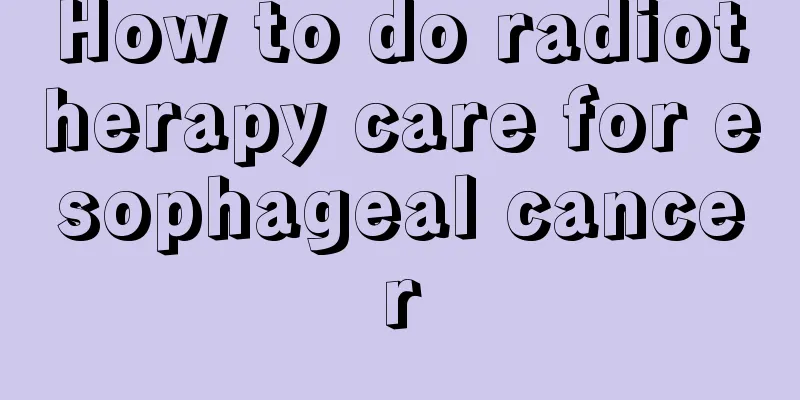How to do radiotherapy care for esophageal cancer

|
Radiotherapy is one of the key methods for treating esophageal cancer. Generally, it is mainly used in combination with surgical treatment of esophageal cancer. Its role is to improve the surgical resection efficiency and the prognosis and survival rate of postoperative patients. Generally, it is most appropriate to use radiotherapy technology about one month before surgery, but care should be taken during this period. The following is an introduction to this aspect: Nursing of patients with esophageal cancer after radiotherapy 1. Psychological care. Esophageal cancer poses a great threat to human life and health. Patients often think that they have an incurable disease and are pessimistic and hopeless, depressed, and have no confidence in treatment. Therefore, nursing staff must first understand the patient's basic condition and psychological state, and implement humane nursing according to the psychological problems reflected by the patient. Especially for patients with esophageal cancer who are receiving radiotherapy for the first time. Nursing staff must first understand the patient's psychological changes, explain the purpose, significance, precautions and possible complications of radiotherapy to the patient, relieve their tension, increase their sense of security, and eliminate their unfamiliarity with nursing staff. Actively introduce the most cutting-edge medical level, technical strength and advanced equipment to patients, so that patients are confident in radiotherapy and receive treatment easily and happily. The support and care of family members play a decisive role in improving the patient's quality of life and adaptability. Due to the heavy economic burden of long-term treatment, patients are prone to social discomfort. Nursing staff should do a good job in ideological work with the patient's family members, requiring them to closely cooperate with and support the doctor. Nursing staff should observe the patient's condition changes, psychological state, diet, rest, etc. at any time, give comfort and encouragement to the patient, avoid negative emotions of family members, and relieve their heavy psychological pressure. 2. Create a comfortable environment. Nursing staff should keep the ward quiet and try to eliminate noise. Avoid nursing operations when the patient is resting. Maintain the temperature and humidity in the ward. Encourage and guide patients to take more walks, read books and newspapers, and listen to their favorite music. Communicate with others to increase mental excitement and distract attention. 3. Care for skin reactions. Due to direct exposure to the skin during radiation, the skin in the radiation area tends to become thinner, atrophy, soft tissue fibrosis, capillary dilation and congestion, and skin lesions are mainly manifested as pigmentation, erythema, desquamation, peeling, and even moist dermatitis. Nursing staff should protect the skin in the radiation area of patients, keep it dry and clean, wear soft, moisture-absorbing, and loose cotton clothes, and do not use soap to scrub the irradiated area. It is forbidden to stick adhesive tapes, and avoid applying ethanol and irritating ointments. Prevent physical and chemical factors from irritating and keep the skin marks in the radiation area clear. Avoid cold and hot stimulation and avoid sunlight. Nursing staff should clean, expose, and dry the skin lesions. Tell patients not to scratch or rub the lesions with their hands, because the skin ulcers in the radiation area are not easy to heal after infection. Wanhua oil can be applied externally. For patients with large-area skin lesions, irradiation should be stopped and the most comfortable skin care should be given to patients to ensure the smooth progress of radiotherapy. 4. Dietary care. Dysphagia is a typical symptom of patients with advanced esophageal cancer. During radiotherapy, patients experience congestion and swelling of the esophageal mucosa, which increases difficulty in swallowing and makes it easy to swallow food, resulting in serious malnutrition. Before radiotherapy, the patient's eating habits should be understood, and attention should be paid to strengthening dietary guidance for patients and their families. Give patients a reasonable, hygienic, and nutritious diet; light, easily digestible, high-calorie, high-protein, high-vitamin, and low-fat food; eat small meals frequently, avoid hard, cold, spicy, and irritating foods; reduce chemical stimulation to the esophageal mucosa. Slow down the speed of eating, chew slowly: when swallowing is extremely difficult, soft food or semi-liquid or liquid food can be taken. Diet is a key point in postoperative care measures for various malignant tumor surgeries, especially in the early postoperative period. Esophageal cancer patients often cannot take food directly, and a gradual process is required. When they can resume a normal diet, they need to pay attention to some dietary taboos and a diet that helps esophageal cancer patients recover. |
<<: What are the post-stent care methods for esophageal cancer
>>: How to care for the elderly with esophageal cancer
Recommend
Can lychee and mango be eaten together
Lychee and mango are two common fruits in our liv...
It turns out there are taboos when eating cod
Many people have the habit of eating fish and hav...
How to effectively treat aplastic anemia
Of course, aplastic anemia cannot be ignored in t...
What are the treatments for femoral fractures?
Under normal circumstances, the femur is not pron...
What are the symptoms of prostate cancer in the elderly
Prostate disease is more common among the elderly...
How many times a week is best for steaming
Steaming is a way for most people to relax their ...
How to choose the best hospital for rectal cancer surgery
The clinical features of early rectal cancer are ...
How to treat scrub typhus
Tsutsugamushi is an insect that often appears in ...
What should I do if my double eyelid surgery goes wrong?
Double eyelids are a common eye shape in life and...
Which type of lenses are good for myopia glasses
Nowadays, many children are found to be myopic wh...
Does swollen lymph nodes hurt? It is actually a sign of many diseases
Lymph node enlargement, most of which have obviou...
My double eyelids are still swollen after a month of surgery
Double eyelid surgery is the simplest plastic sur...
The reason why hair becomes curly
Curly hair is a fashion pursued by many people, b...
What foods are effective in delaying aging?
Aging is almost irresistible for us, especially a...
Can colon cancer be cured by removing a malignant tumor?
Whether or not a malignant colorectal cancer tumo...









